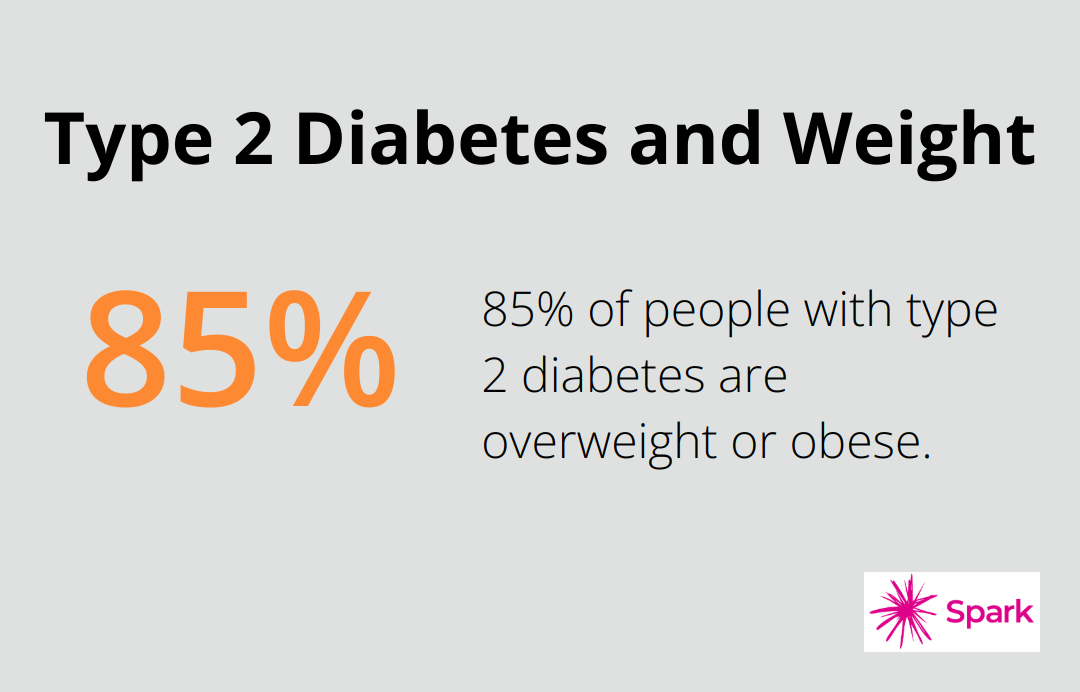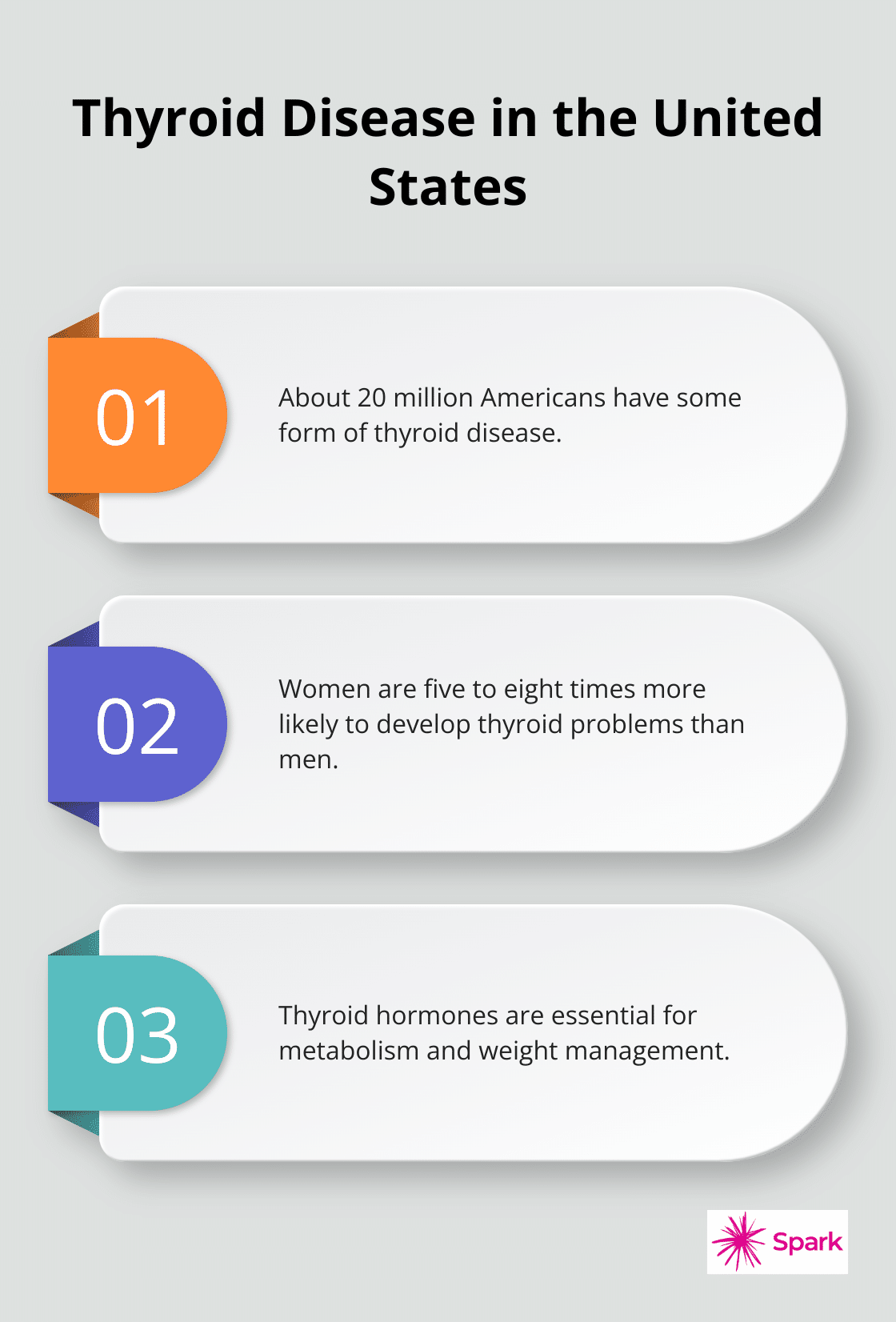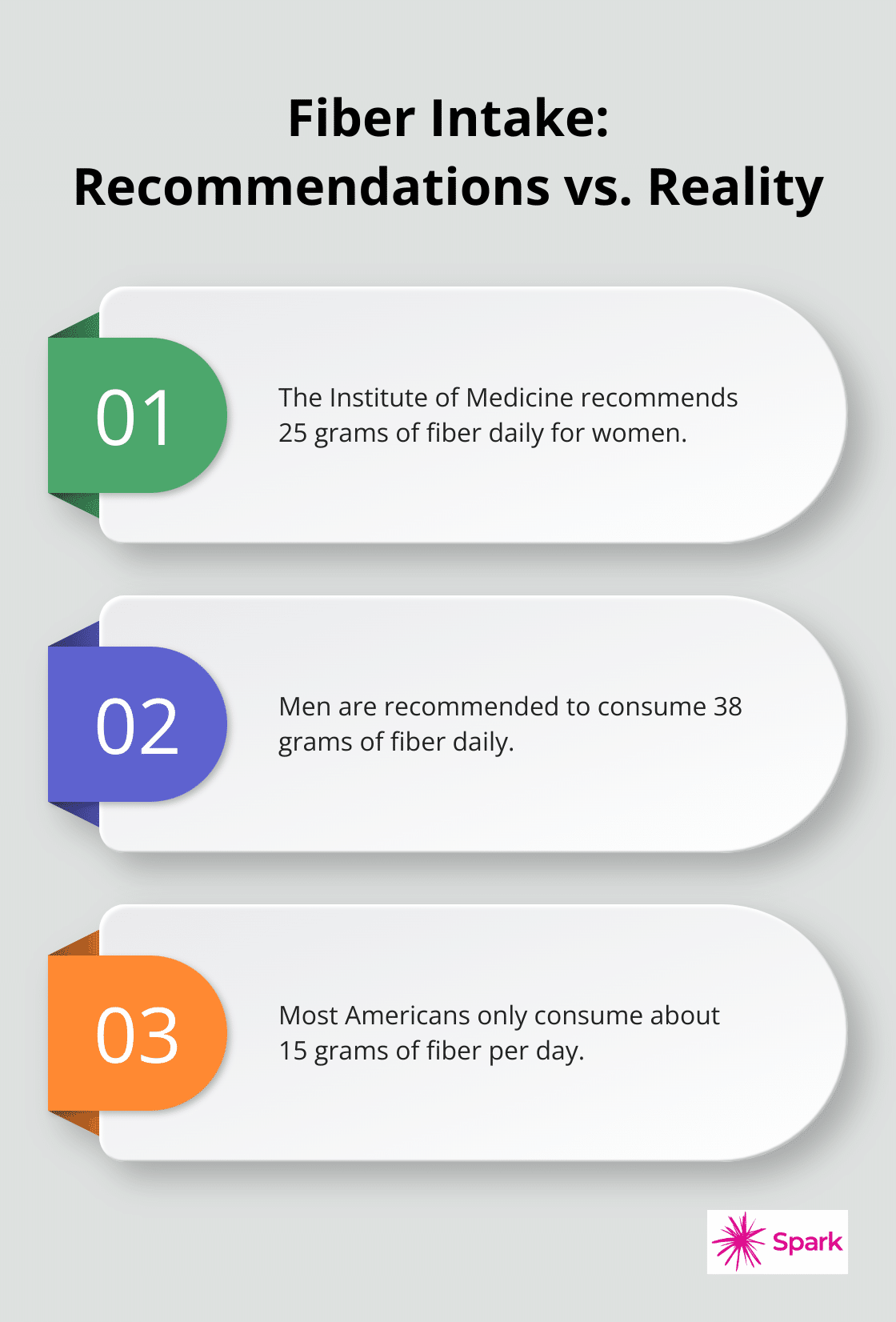At Spark Healthcare, we understand the intricate relationship between hormone health and weight loss. Many people struggle with weight management, unaware that hormonal imbalances may be sabotaging their efforts.
Hormones play a crucial role in regulating metabolism, appetite, and fat storage. In this blog post, we’ll explore how hormones impact weight and provide practical strategies for achieving hormonal balance to support your weight management goals.
How Hormones Control Your Weight
The Hormone-Weight Connection
Hormones act as powerful chemical messengers that significantly impact your weight. Insulin, produced by the pancreas, plays a key role in weight control. It regulates blood sugar and fat storage. Insulin resistance can raise a red flag that a person is trending toward diabetes. The American Diabetes Association found that 85% of people with type 2 diabetes are overweight or obese.

Leptin, known as the “satiety hormone,” tells your brain when you’re full. However, obesity can cause leptin resistance, which makes it harder to feel satisfied after eating. Research shows that leptin levels are typically higher in obese individuals, but their bodies don’t respond to it properly.
Metabolism and Hormones
Thyroid hormones are essential for metabolism. An underactive thyroid (hypothyroidism) may cause some weight gain. The American Thyroid Association reports that about 20 million Americans have some form of thyroid disease, with women being five to eight times more likely to develop thyroid problems than men.

Cortisol, the stress hormone, can lead to weight gain when chronically elevated. It increases appetite and drives cravings for high-calorie foods. A study in the journal Obesity found that people with higher cortisol levels tend to have higher BMIs and larger waist circumferences.
Hunger, Satiety, and Hormonal Balance
Ghrelin, often called the “hunger hormone,” stimulates appetite. Levels typically rise before meals and fall after eating. However, in overweight individuals, ghrelin levels may not decrease as much after meals, which leads to overeating.
Peptide YY (PYY) is released after eating and helps you feel full. A study in the New England Journal of Medicine found that obese people have lower PYY levels, which may contribute to increased food intake.
The Role of Telehealth in Hormone Management
Understanding these hormonal influences is important for effective weight management. Telehealth consultations (like those offered by Spark Healthcare) can help you navigate your hormone health and develop personalized strategies for weight control. Through remote consultations, healthcare providers can assess your hormone levels, discuss symptoms, and create tailored treatment plans.
Telehealth services offer convenience and accessibility, allowing you to receive expert guidance from the comfort of your home. This approach can be particularly beneficial for ongoing hormone management, as it enables regular check-ins and adjustments to your treatment plan as needed.
As we move forward, let’s explore common hormonal imbalances that can significantly impact your weight and overall health.
Hormonal Imbalances That Sabotage Weight Loss
Thyroid Troubles: When Your Metabolism Slows Down
An underactive thyroid (hypothyroidism) can significantly impact your weight. The American Thyroid Association reports that about 4.6% of the U.S. population has hypothyroidism. This condition slows down metabolism, which makes weight gain easier and weight loss harder.
Symptoms of hypothyroidism include fatigue, cold sensitivity, and unexplained weight gain. A simple blood test can check your thyroid hormone levels if you suspect thyroid issues. Treatment usually involves thyroid hormone replacement medication, which can help normalize your metabolism and support weight loss efforts.
Stress and Cortisol: The Weight Gain Double Whammy
Chronic stress leads to elevated cortisol levels, which can derail your weight loss efforts. A study published in the journal Obesity found that higher cortisol levels correlated with higher BMI and larger waist circumference.
High cortisol levels increase appetite, especially for high-calorie, comfort foods. It also promotes fat storage around the midsection. To combat stress-related weight gain, try stress-reduction techniques like meditation, yoga, or deep breathing exercises. Regular exercise can also lower cortisol levels and improve overall stress management.
Insulin Resistance: The Silent Weight Gain Promoter
Insulin resistance is a precursor to type 2 diabetes and can significantly impact your body composition. When your cells become resistant to insulin, your body produces more of this hormone to compensate. High insulin levels promote fat storage and make weight loss difficult.
The Centers for Disease Control and Prevention (CDC) estimates that 10.8% of adults had prediabetes, based on both elevated fasting plasma glucose and A1C levels. To improve insulin sensitivity, focus on a diet rich in whole foods, particularly non-starchy vegetables and lean proteins. Regular exercise, especially strength training, can also improve insulin sensitivity.
The Role of Telehealth in Addressing Hormonal Imbalances
Telehealth consultations can help identify potential hormonal imbalances and create personalized strategies to address them. Through remote consultations, healthcare providers can assess hormone levels, discuss symptoms, and create tailored treatment plans. This approach offers convenience and accessibility, allowing you to receive expert guidance from the comfort of your home.
Now that we’ve explored these common hormonal imbalances, let’s move on to practical strategies you can implement to balance your hormones and manage your weight effectively.
How to Balance Your Hormones for Weight Management
Eat for Hormone Health
Your diet significantly impacts hormone balance. Focus on whole, nutrient-dense foods that support hormone production and function. Include plenty of healthy fats like avocados, nuts, and olive oil. These fats are essential for hormone production. High adherence to the Mediterranean Diet is associated with a lower risk of type 2 diabetes.
Protein plays a key role. Try to consume 20-30 grams of protein per meal. This helps balance blood sugar and reduces levels of ghrelin, the hunger hormone.
Fiber supports gut health, which is closely linked to hormone balance. The Institute of Medicine recommends 25 grams daily for women and 38 grams for men. Most Americans only get about 15 grams, so there’s room for improvement.

Exercise for Hormonal Balance
Exercise powerfully balances hormones. High-intensity interval training (HIIT) has shown particular effectiveness in weight reduction in obese people.
Strength training boosts testosterone and growth hormone levels, which help build muscle and burn fat. Try to include at least two strength training sessions per week. The American College of Sports Medicine recommends 8-12 repetitions of 8-10 different exercises targeting all major muscle groups.
Don’t overlook recovery. Overtraining can lead to elevated cortisol levels, which promotes weight gain. Include rest days and get adequate sleep. The National Sleep Foundation recommends 7-9 hours per night for adults.
Lifestyle Changes for Hormone Health
Stress management is vital for hormone balance. Chronic stress elevates cortisol, which can lead to weight gain, especially around the midsection. Incorporate stress-reduction techniques into your daily routine. Mindfulness interventions may increase the sensitivity of immune cells to the anti-inflammatory effects of glucocorticoids.
Sleep disrupts several hormones involved in weight regulation, including ghrelin and leptin. Create a consistent sleep schedule and try to get 7-9 hours per night. A study in the Annals of Internal Medicine found that dieters who got adequate sleep lost 55% more body fat than those who were sleep-deprived.
Limit exposure to endocrine disruptors, chemicals that can interfere with hormone function. These are found in many plastics, pesticides, and personal care products. Choose organic produce when possible and opt for natural personal care products.
Telehealth: Your Partner in Hormone Management
Managing hormones for weight loss can be complex. Telehealth services offer personalized consultations to help you navigate your hormone health journey. Experts can provide tailored advice, monitor your progress, and adjust your plan as needed, all from the comfort of your home.
Telehealth allows for more frequent check-ins, which can be crucial when managing hormones. It also provides access to specialists who might not be available in your local area. A study in the Journal of Medical Internet Research found that telehealth interventions were as effective as in-person care for weight management, with the added benefit of increased patient satisfaction.
Final Thoughts
Hormone health and weight loss are intricately connected. Various hormones impact metabolism, appetite, and fat storage, playing a significant role in body composition and overall health. Addressing hormonal imbalances often provides the missing piece in successful weight management strategies.
Nutrition, exercise, stress management, and sleep all contribute to hormonal balance. These lifestyle changes support the body’s natural hormone function and create an environment conducive to weight loss and overall well-being. However, navigating hormone health can be challenging, making professional guidance essential for developing a personalized approach.
At Spark Mental Health, we offer telepsychiatry services to help address mental health concerns that may impact your weight loss journey. While we don’t directly treat hormone imbalances, our mental health support can complement your overall health strategy (addressing issues like stress and anxiety). Take the first step towards improved hormone health and weight management today.






